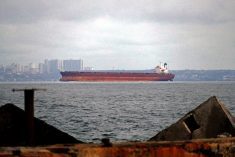The Baltic Dry Index fell to its lowest levels ever on Friday, which bodes well for the competitiveness of Canadian grain exports.
The BDI, a gauge of global ocean freight prices, was quoted Friday at 498 points — the first time the index dipped below 500 since records began in 1985.
The index was trading above 1,200 as recently as the beginning of August, but has found itself in a steady decline over the past three months.
The BDI, compiled daily by the London-based Baltic Exchange, provides an assessment of the price of moving major raw materials by sea, including grain.
Read Also

U.S. grains: Soybeans retreat after one-month high; corn, wheat sag
Chicago Board of Trade soybean futures turned lower on Tuesday on profit-taking after the benchmark contract touched a one-month high in early moves, while market players continued to monitor U.S.-China trade relations, analysts said.
An overcapacity of ships, a slowdown in Chinese demand for building materials, weakness in crude oil and declining commodity prices have all been cited as contributing factors to the lower freight rates.
As far as Canadian grain and oilseed exports are concerned, the lower freight rates even the playing field in some cases by lessening the importance of shipping costs in the final price to the buyer.
For example, while Australia will always be closer to China than Vancouver, lower freight rates lessen the importance of shipping costs in the final price. — CNS Canada
















